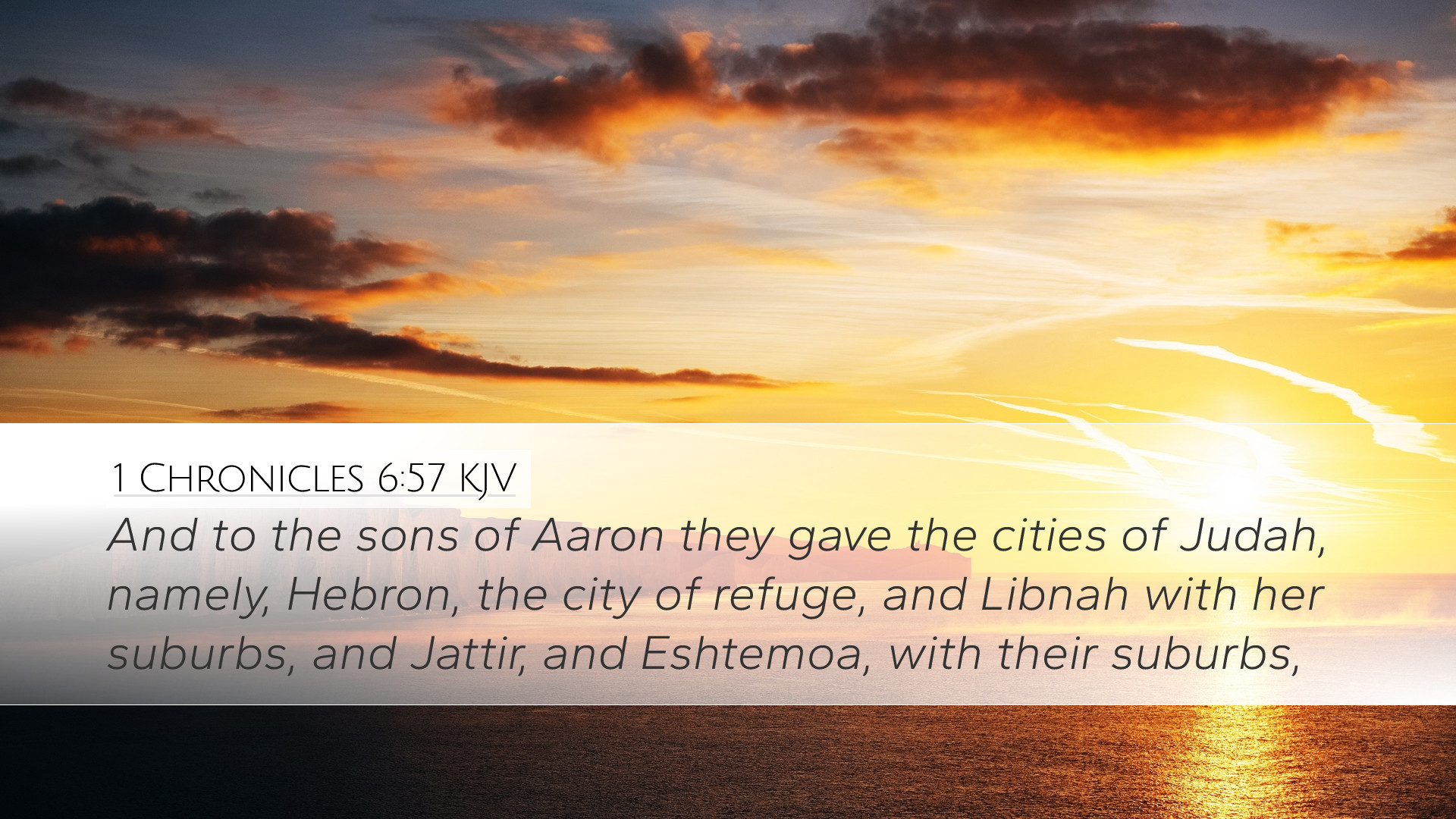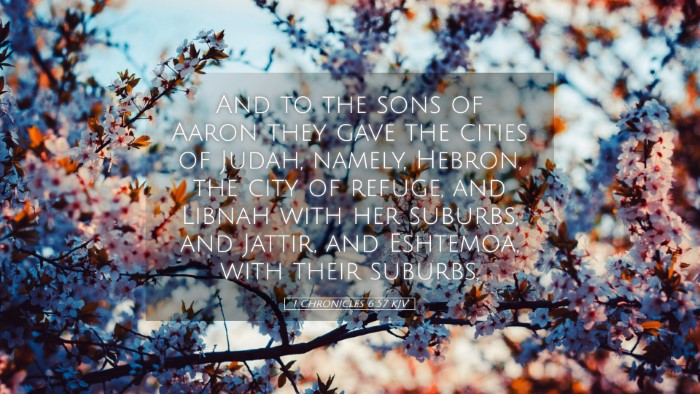Commentary on 1 Chronicles 6:57
Verse Reference: 1 Chronicles 6:57 - "And to the sons of Aaron they gave the cities of Judah, the city of refuge, and the cities of the Levites." (1 Chronicles 6:57, ESV)
Introduction
The genealogies found in 1 Chronicles encapsulate not only the history but also the religious structure of Israel. This particular verse is a critical component in establishing the importance of the Levitical priesthood and their designated cities. Understanding this verse requires reflecting on the broader narrative and theological implications contained within the Chronicles.
Historical Context
The Chronicler aims to emphasize the unity and continuity of the priestly lineage, particularly focusing on Aaron's descendants. This is essential as the priesthood represents the covenant between God and His people. The mention of cities highlights their role within a divinely ordained structure that ensures the sanctity and operation of worship in Israel.
Insights from Commentaries
Matthew Henry's Commentary
Priestly Heritage: Matthew Henry stresses that the distribution of cities among the Levites, particularly the descendants of Aaron, symbolizes God's providential care for the priestly order. He explains that these cities serve as both habitation and sanctuaries, providing refuge not only for the priests but also for those seeking forgiveness and sanctuary.
Significance of City of Refuge: Henry further elaborates that cities of refuge exemplify God’s mercy, offering safety for involuntary manslayers. This aspect underscores the compassionate nature of divine justice, suggesting a deep connection between the sacrificial system and the need for atonement.
Albert Barnes' Notes
Geographical and Legislative Importance: Albert Barnes indicates that the cities allotted were not only geographically significant but were also vital in delineating the jurisdictional authority of the Levites. He notes that these cities were strategically spread across Judah to ensure community access to worship centers, reflecting a structure that is both practical and theological in its implications.
Liturgical Function: Barnes points out that these cities served important liturgical functions. The Levites, as mediators between God and the Israelites, required dwelling places within reach of all tribes, which allowed them to teach and guide the people spiritually, thus fostering a robust community of faith.
Adam Clarke's Commentary
Connection to Levitical Duties: Adam Clarke highlights the duty of the Levites in relation to their cities, noting that the arrangement of cities served to facilitate their religious responsibilities. Clarke emphasizes that these arrangements underscore the principle that the Lord provides for the needs of those who serve Him in ministry.
Theological Implications: In addition, Clarke posits that the distribution indicates a divine ordering of priestly roles. The act of giving these cities is seen not just as a practical allocation of land but as an act of divine ordinance, thus reinforcing the theological belief that all provision and authority come from God.
Theological Reflections
1 Chronicles 6:57 extends beyond historical recounting; it invites readers into a deeper theological understanding of God’s provision, the nature of justice, and the role of the priesthood. The cities of refuge serve as a prefigurement of Christ, where sinners find safety and redemption. This connection calls us to consider how we, as modern-day priests (1 Peter 2:9), are tasked with reflecting God's grace in our communities.
Practical Applications for Today
- Understanding Our Role: Just as the Levites were set apart to serve, believers today are called to affirm their priestly identity, understanding the importance of their spiritual gifts within the context of their community.
- Emphasizing Refuge: Churches should embody the essence of these cities of refuge, offering safety, grace, and support to those who are weary or burdened.
- Promoting Community Access: Pastors and leaders are charged with ensuring that worship spaces are accessible to all, promoting inclusivity in worship and ministry.
Conclusion
In sum, 1 Chronicles 6:57 encompasses a multifaceted narrative that speaks to the continuity of God’s plan for redemption and community. The insights derived from classical commentaries underscore the enduring significance of this passage for contemporary believers, inviting an appraisal of how we live out our faith in service to God and one another.


